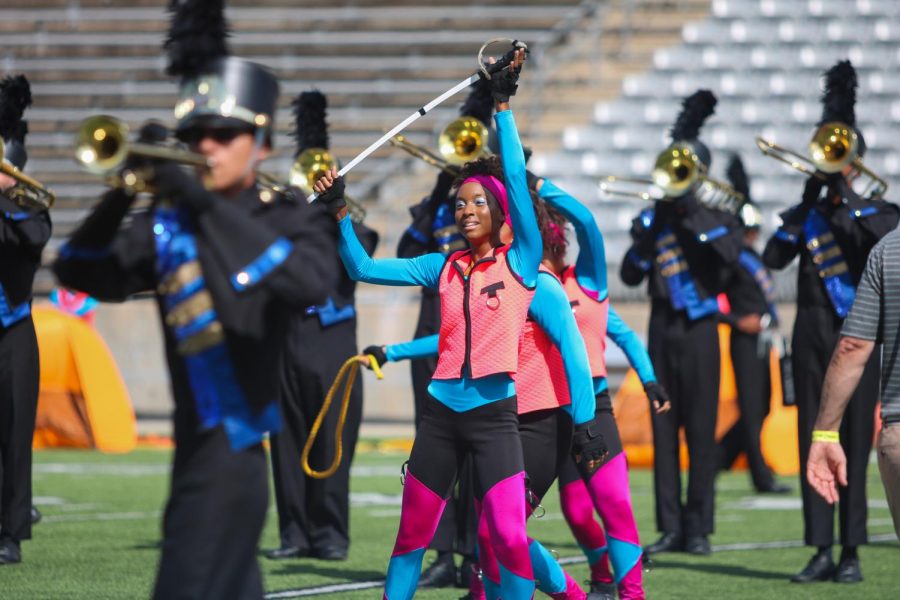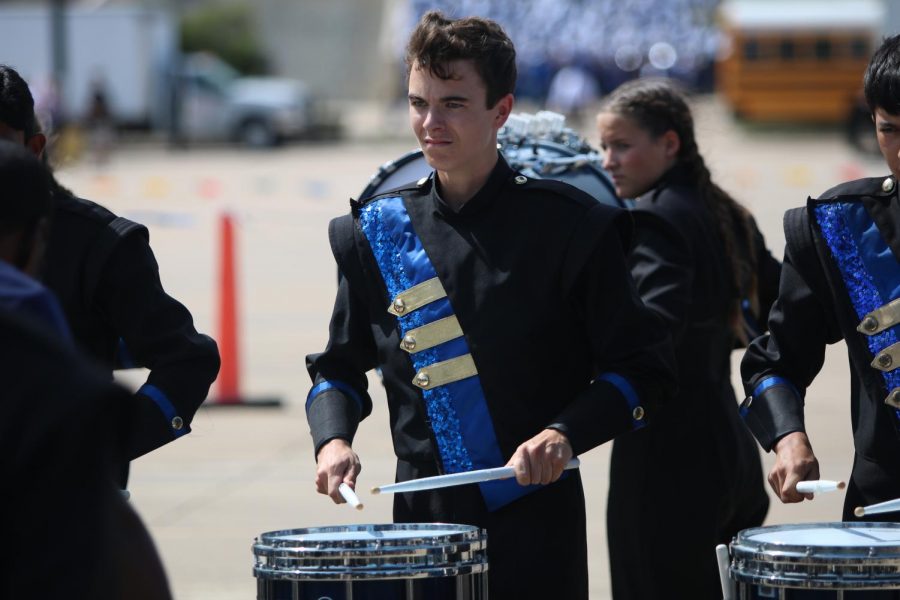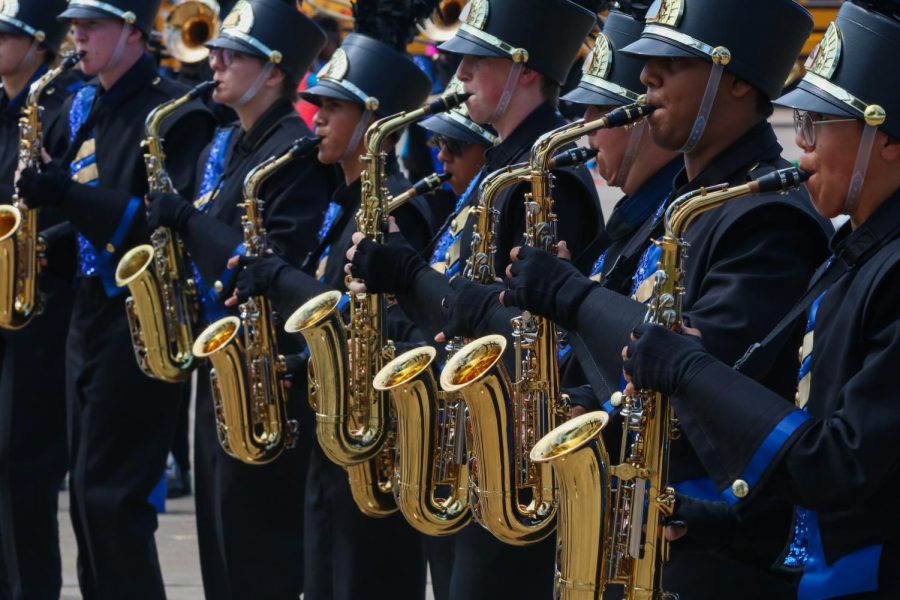An Inside Look at the Cypress Ranch Mustang Band
November 28, 2018
We (The Mustang Messenger) wanted to wait until the competitive marching band season came to a close before we publishing this piece, which has been in the works for a while. As the Cypress Ranch Mustang Band are 2018 area finalists (no small feat in this region), this piece has been reworked.
If you’ve ever been to a Cypress Ranch event, you’ve likely heard the bombastic, bassy anthem of the Cypress Ranch Band thundering throughout the venue. Whether it be at a football game (#MWT) or a pep rally, the Band have a signature sound and are one of the pillars of fine arts at Cypress Ranch.
But developing such a sound is not easy. Band — while on the surface is a simplistic elective — is much more complex than most people give it credit for. Spanning across multiple periods and hours of outside-of-school practice, Band brings together over one hundred musicians to perform together, whether for a large audience or for competition.
What is band?
I went down to the Band room to see Mr. Holcombe, the lead director of the Cypress Ranch Band. As the head director, Mr. Holcombe oversees the entirety of the Band, and also works with his assistant band directors: Mr. Siegrist, Mr. Greene, and Ms. Kaminski.
“Band is all the wind instruments and percussion instruments” was the first thing Mr. Holcombe told me about Band. “String instruments make up Orchestra and vocalists make up the Choir.”
Band is an ensemble that plays a select array of instruments, which primarily comprises of wind instruments and percussion instruments, such as the trumpet, cymbals, clarinets and the ever-notable bass drums. The selection of instruments are primarily exclusive to Band, with string instruments — as well as some select wind instruments — considered Orchestra.
Speaking of Orchestra, it may be easy for students who aren’t within the musical world to mix up the two organizations. Mr. Holcombe explained to me how the two differ in not just their instruments, but also their performance opportunities. “Because of the nature of the instruments, [Orchestra] performing outside is not a good thing,” Mr. Holcombe explained further. But in terms of playing in rhythm and with emotion and direction, Orchestra, Band, and Choir all share those traits.
Separate from the main ensemble is Color Guard, which is formally a part of the Band. Color Guard coordinates dances, mainly with flags, sabers, and rifles; that pair with the music played and are important to the visual aspect of a marching band production.

The Cypress Ranch Color Guard performs alongside the Band
“I feel like in being in Band in general, you get to share your emotion through music and fine arts and performing,” Mr. Greene commented. “It’s exciting. It’s a lot of fun.”
While Band is easy to define, Band members are a lot more varied. The only universally shared trait among Band members is a passion for music. But even with Band’s diverse assemblage, the common love for music shines through, with the total ensemble still performing exceptionally well at events and in competition.
What does Band do?
It should be fairly obvious to the common student that being in Band requires playing an instrument of some kind — unless you’re in the Color Guard (and even then, a lot of Color Guard members also play instruments).
“Band in the fall is a marching band that you see throughout all the Football games and we have some marching contests that we go and compete in as well. And then, in the spring, we do all concert groups,” Mr. Holcombe described to me. “That’s the Band program.”
An overwhelming majority of Band students transition over from middle school, and typically retain the instrument they played back at their previous school. However, certain instruments only allow a certain amount of people to use them (limited instruments, limited space, limited spots) and require students to go through an audition process.
During the school year, students learn how to play music. Students typically rehearse with other students during their Band period, however, it can vary depending on the period they’re assigned. For grading, students are graded based on their final performance, rather than through a quiz or a test like most “traditional” classes.
Band’s performances vary depending on the current semester. For the Fall Semester, Band primarily works in conjunction with Football, as they play extensively at Pep Rallies and also at Cypress Ranch Football games during halftime, playing the school Alma Mater and the Star-Spangled Banner. These marching performances are done in preparation for marching competitions, with Band participating in several competitions around the Houston area, including the UIL marching competition.
“There’s a region, area, and state level,” Mr. Holcombe said regarding UIL. “We’ve participated in region and area every time it’s happened, but we’re still working to get to that state level. We hope that that can happen this year. We’re taking steps to hopefully get there.”
In the spring semester, Band focuses on competition and accuracy rather than entertainment in front of thousands of spectators. Band plays in concert groups, which also have a UIL competition. The semester also features multiple individual competitions which students can participate in.
“There are also some individual competitions that the kids participate in,” Mr. Holcombe explained. “They get the opportunity to try out for the all-region band. We’ve done real well with that in the past and if they place high enough in the region, then they go to the area level. And at the area level, they get the opportunity to try for all-state. Last year, we had two all-staters that were both seniors, but there’s a number of students playing really well this year and they’ll have a chance to do that as well.”
Lastly, the spring semester has Solo-and-Ensemble, which is a competition that allows students to play alone and in groups, with the size of groups ranging from three to more than twenty.
The Color Guard also have competitions during the Spring semester, where the compete against other schools in different types of routines. Every part of Band has sort some of competition or event throughout the entire school year.
“It’s not the same the whole year,” Mr. Holcombe stressed. “We’re not marching the whole year, but it is a full year of activities and competitions for the students to compete and enjoy.”
What does it take to be in Band?
“Another cool thing is that not everyone is a soloist,” Mr. Holcombe stated. “There are students that spend significantly more time than other students because they have a more demanding part or even a solo, but every part’s important.”
As the Cypress Ranch Band is spread across multiple periods, the only time that the whole ensemble gets to play together is (usually) after school. As a result, Band members often spend a lot of time outside of school in order to practice with the rest of the periods and practice choreography, or “drill.”
“Being in band is a real challenge,” junior Phlip Whaley told me. “In order to be a part of the organization, you have to have discipline, heart, and a good attitude. We are taught to push as hard as we can, every rep, even with the heat because it can get unbearable at times. But that’s part of the experience. Hitting our dots on the field, keeping good spacing, and playing with good sound are what we work for from July-December.”
Being in Band is no simple task, requiring lots of time and dedication. While Band isn’t perceived as a cakewalk by most students, many Band members argue that people underestimate the amount of time and effort required to participate in Band.

A little recognition never hurts.
But the time you dedicate to Band is not entirely based on a schedule taped to the wall. The time members dedicate to Band is mostly decided by the members themselves and how much they want to practice their instrument.
“So, how much time is involved? Depending on how hard they want to push and what part they achieve, it can be a lot of time,” Mr. Holcombe explained. “It can be a very demanding amount of time, but it doesn’t have to be. It depends on what they [students] want to accomplish.”
While I was speaking to the Band directors, Mr. Greene explained to me how he perceives Band not just as an activity, but also a culture. “You decide that you want to participate in Band and you want to do well,” Mr. Greene explained. “It takes an overloaded amount of commitment and there are going to be some things in your life that you have to sacrifice in order to make it work… without that sacrifice, you’re just participating and you’re not going for excellence. You’re just in it to be in it. We’re breeding a culture where we want the kids to strive for excellence every single time we take the field.”
Why do people play in Band?
As a common fine art, Band gives many opportunities for students following their departure from High School. Scholarships are provided by some universities to Band students, seeking to capture the talent for their own performances at college events.
“It takes the correct effort from everybody, which can be [tough] if you let it be, but it also can be extremely rewarding when it happens,” Mr. Holcombe said. “We’re fortunate that the students work really hard and overcome whatever obstacles are in front of them ability-wise or whatever to get it done, and we get to enjoy the ride along with them if we’re finally performing at a high level.”
But Band is not just about the music. It is also about developing skills required to overcome obstacles and working towards a goal, both alone, with groups, and with a full ensemble. Some Band members don’t see practice as laborious, but rather a fun challenge to overcome.
Universities also focus on this too; dedicating hours upon hours of time to an activity such as Band for several years shows a level of commitment and discipline, which many schools may see as extremely desirable in students.

Philip Whaley (11) is one of the percussionists in the Cypress Ranch Band.
“Imagine working all summer, 8 hours a day every day, then 3 hours a day every school day [after school] till December, for a 7 minute segment,” Philip Whaley described to me. “That’s what being in band is all about. We trust our band directors and our fellow friends along with us to deliver the best show that we can, every rep. Because it’s not just about us. Our performance affects everyone else’s, too. Meaning we have to practice, and take the strides to be the best. Because at the end of the day, it’s not about what the judge in the box says about us. It’s about knowing that we gave our all every day to playing great, marching with excellence and making ourselves proud. That’s the real prize. That’s what being in band is all about.”
The Band recently participated UIL Area Finals — a high achievement considering the competitive nature of this region. Further competitions are set to begin in the spring, as individual groups and the Band as a whole look to climb back up the ladder at UIL regional events.
“Trust, Commitment, Excellence. That’s the Cypress Ranch Band motto for a reason.”
